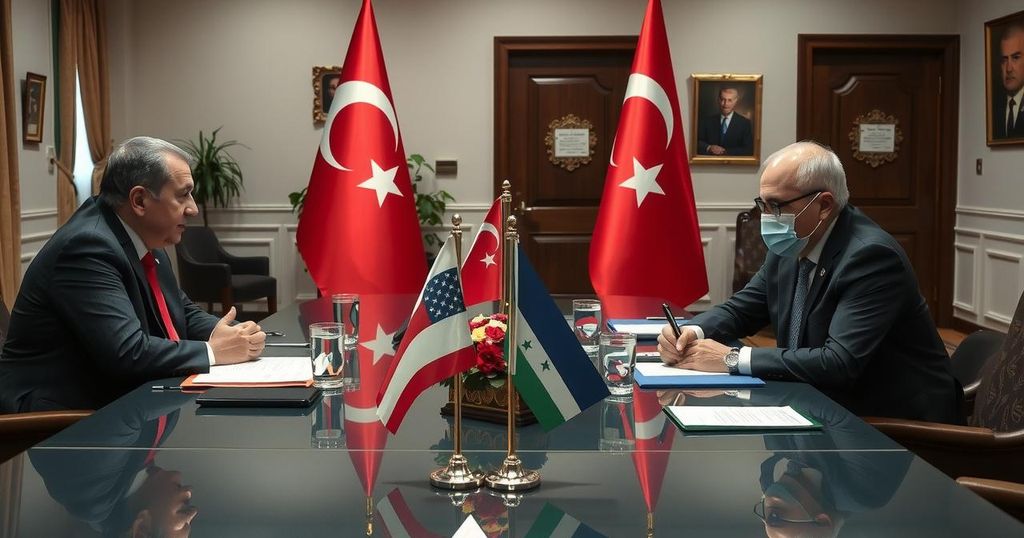Turkey’s Foreign Minister Engages with Syrian Leader Amid Conflict

Turkey’s Foreign Minister Hakan Fidan engaged with Syrian leader Ahmed al-Sharaa in Damascus to discuss support for Syria’s new government following the fall of Bashar al-Assad. This dialogue occurs amid ongoing military tensions in Syria’s northeast, where Turkey aims to counter Kurdish influence. President Erdogan emphasized Turkey’s commitment to assisting in Syria’s reconstruction and governance reform, highlighting a significant shift in regional alliances.
Turkey’s Foreign Minister, Hakan Fidan, recently met in Damascus with Ahmed al-Sharaa, also known as Abu Mohammed al-Golani, the de facto leader of the Islamist group Hayat Tahrir al-Sham. This meeting follows the recent fall of Bashar al-Assad from power, as Turkey expressed intentions to support the new Syrian administration in establishing a new governance structure and drafting a new constitution. Images of Fidan and Sharaa showed a cordial atmosphere, indicative of Turkey’s shifting alliances in the region.
During a press statement, Turkish President Tayyip Erdogan asserted Turkey’s commitment to assisting Syria’s emerging leadership while expressing hopes for the return of Syrian migrants currently residing in Turkey. This meeting also follows discussions between Ibrahim Kalin, the head of Turkey’s intelligence agency, and Syrian officials in Damascus shortly after Assad’s exit.
Simultaneously, military tensions persist in northeastern Syria, where Turkish-backed fighters confront the Kurdish YPG militia, allied with the U.S.-backed Syrian Democratic Forces. Turkey dismisses the YPG as a terrorist organization and anticipates that the new Syrian leadership, including the Syrian National Army, will successfully expel YPG fighters from the region.
Furthermore, Ankara has conducted numerous cross-border operations against Kurdish factions and now controls substantial territories along the Syria-Turkey border. As the Syrian Democratic Forces face potential advancements from both Turkey and pro-Ankara groups, their political position is increasingly precarious. The newly established Syrian leadership appears to favor Ankara, intensifying the implications for regional control and stability.
In the context of a protracted civil conflict in Syria lasting over a decade, Turkey has positioned itself as a key player in the politics and military engagements surrounding the situation. The fall of Bashar al-Assad, who held power for over 50 years, has altered the dynamics significantly, prompting Turkey to engage diplomatically with emerging Syrian authorities. The Islamist group led by Ahmed al-Sharaa has assumed a prominent role in providing governance post-Assad, which Turkey is now keen to support. Additionally, Turkey’s historical backing of anti-Assad rebels and its ongoing struggles against Kurdish factions complicate the landscape, presenting both opportunities and risks in the pursuit of regional influence.
In summary, Turkey’s strategic engagement with Syria’s new leadership, exemplified by Foreign Minister Fidan’s recent meeting with Ahmed al-Sharaa, signifies a fundamental shift in regional power dynamics following the overthrow of Bashar al-Assad. With Turkey’s intention to assist in rebuilding Syria and addressing the Kurdish threat in the northeast, this development could reshape the political and military landscape in the region. The outcome of these interactions is likely to have lasting implications for both Syrian stability and Turkish interests in the years to come.
Original Source: www.hindustantimes.com








